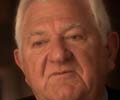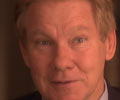- People
- John Weaver
- Victoria Clarke
- Orson Swindle
- Charlie Cook
- Lindsey Graham
- Mark McKinnon
- Mark Salter
- Michael Shear
- Tom Davis
- Matt Bai
- Ron Brownstein
- Ryan Lizza
- Peter Baker
- Related Links
- The Unmaking of a President
GQ's story on the McCain campaign's 2007 collapse. - On The Bus
Ryan Lizza's New Yorker February 2008 piece on McCain's comeback.
John Weaver McCain chief political adviser, 1997-'07
 Read the full interview >
Read the full interview >
Do you build pretty much a Bush-like campaign structure? What's the thoughts going in?
Our attempt was try to nail the best of the two, the authenticity of John McCain with the organizational power and focus that [Bush-Cheney 2004 campaign chair] Ken Mehlman had put in place in the president's re-election in 2004. It had been there that [Bush] had defeated us in 2000. So we wanted to bring the best of that but at the same time make sure that John was the authentic John McCain. That was our goal, quite frankly.
There's a lot said now that that was sort of wrong for Mr. Straight Talk, and that it took a falling apart before you could see the quintessential John McCain.
I don't know about that, because in the middle of that, this Mr. Straight [Talk] was leading the way on immigration policy that was not very popular within our party. He was advocating a surge that was controversial. At no point did he trim any of his sails on what he cared about and believed in.
[The campaign] ultimately imploded, primarily because it was structurally not sound. Campaigns have to be benevolent dictatorships on a good day. This one turned out to be chaos, and campaigns cannot be chaotic. ...
... So the use of the recent negative ads?
I think they were unnecessary at this point. For a negative ad to work, they have to be true. They have to pass certain thresholds. Sen. Obama has been a U.S. senator 200 days. I don't think you can blame him for gas prices. And so what these ads have done, it's allowed Obama to have the moral high ground at a time when you look at John McCain and his narrative and life, and he should always have the high ground in the campaign. That's my take on it.
I believe, as I've said before, that the honor that's within the senator, the thing that drives him, his ideology, will keep the campaign from going too far into an abyss. But it's a tough business. There's a lot at stake, and there are a lot of third parties that are not under anyone's control. I understand that. But I am hopeful that the senator can keep the campaign on a course that he'll be proud of.
Victoria Clarke Former McCain press secretary, 1983-'89

I remember way back in 2007 hearing a McCain staffer saying, ... "We're going to adopt the Bush model." ... And I thought, it's not his nature; it's not his style; it's not going to work. He's not used to having hundreds and thousands of people around him in this huge bureaucracy. And it didn't work.
And one of the very legitimate questions people raised during the primary process was, if he can't manage this campaign better than they have ... how's he going to run the Untied States?
The same charge is made about Hillary Clinton. ... So you look at Hillary Clinton, you look at John McCain: both very good politicians, both very successful in their own right. The challenges [were] on the organizational front.
Orson Swindle McCain adviser; prisoner of war, 1966-'73
 Read the full interview >
Read the full interview >
When things started to go awry, I had my theories. And he asked me, "Go over there and sit in on the meetings and tell me what you think." And I did that for a week or two, and he said, "What do you think?" I said, "It's a bleeping mess." (Laughs.) ...
I saw a massive operation dominated by political consultants making a lot of money, ... excessive spending of money and a mentality that would have him pretty well scripted and doing it the way ... they did with President Bush. ...
And I just said: "John, you've just got to be yourself and surround yourself with a small team. All we've got to do is win three or four of the first five or six primaries and we've got this thing won."
Charlie Cook The Cook Political Report

There was sort of an inherent contradiction in McCain's candidacy. Back in 2000, he ran as a maverick, an independent. He was on the Straight Talk Express, and he learned very painfully that mavericks usually don't win party nominations. ... It was as if McCain decided after the 2000 election, "If I ever get another shot at this nomination, I'm going to have to be more acceptable to the establishment and to conservatives in the party."
No Republican member worked harder for President Bush's re-election in '04 than John McCain. ... But the thing is, the people that liked John McCain 1.0 -- the maverick, the independent -- they're looking in horror at this guy saying: "Who are you? I don't even recognize you anymore."
Meanwhile, the establishment and conservatives, they're remembering him voting against the Bush tax cuts. They remember McCain-Feingold [the campaign finance reform law], what they saw as horribly liberal governmental intrusion on the political process. They remember McCain opposing President Bush on the treatment of detainees in Guantanamo and all that. And they still don't trust him.
And so McCain was stuck in this political purgatory where the people that liked the maverick, the independent didn't trust him anymore, and the establishment conservatives still wouldn't embrace him. ...
I think the second piece of it had to do with the war in Iraq. ... McCain was so closely identified with the war that I think a lot of Republicans started wondering, "Do we really want to nominate someone who's synonymous with this war that's not doing well?" ... It wasn't until the surge kicked in and casualties started coming back down ... that that weight started coming off, allowing him to come back up.
The third thing that I think caused his demise was immigration. ... President Bush and Sen. McCain were more sympathetic with immigrants, but let's face it: The passion, the zeal, the energy in the Republican Party is on the anti-immigrant side. ... And then something happened in the latter part of '07 where the focus started shifting away from immigration in most of the country, allowing him to come back up.
The final thing had to do with money. McCain put together a fabulous campaign operation: some of the best people that had worked in his past campaigns; some of the best people from President Bush's two presidential campaigns; some of the best Republican operatives around. A really first-rate operation, very expensive.
Now, one thing I've noticed over the years: You show me someone like John McCain who really believes in campaign finance reform and really thinks that money in politics is evil, and I'll show you someone that's not a very good fundraiser. ... The whole financing of his campaign seemed to be predicated on the inevitability of his nomination, and once that was called into question, the campaign just went belly-up.
Lindsey Graham Senator (R-S.C.)
 Read the full interview >
Read the full interview >
If you ask me, the big moment for John was when we went to Baghdad, July 4, 2007. The Straight Talk Express had hit a wall. His obituary was being written every day in about 10 different ways. Every talk show, every newspaper had written John off.
So we go to Baghdad at the request of Gen. [David] Petraeus. There was a re-enlistment ceremony in Gen. Petraeus' headquarters. Six hundred eighty-eight people re-enlisted in theater. They could have come home, but they wanted to stay another tour and fight.
John spoke to them, and it was one of the most eloquent, moving speeches I've ever heard, not a dry eye in the house. One hundred and thirty people became American citizens ... that day. ... [There] must have been 2,000 people there witnessing this ceremony and nobody left. We came back into the main ballroom there, and people were still there. He stayed there for hours having his photo made. And coming back, he said: "You know, we can't quit. These guys, ... they're not going to quit. I'm not going to quit."
He came back home, he got everybody in a room and said: "Here's the deal. Get a million dollars. We're going to run this campaign on a million dollars. If I have to take a cab, I'm going to take a cab. If I have to fly coach, we're going to fly coach." ... And we just really got committed.
Mark McKinnon Media adviser, McCain campaign, 2007-'08; media adviser Bush re-election campaign

Merle Haggard has a great song called, "If we make it through December, everything's gonna be all right, I know." And that was just it. It was as simple as, let's just make sure we're on the field in the fourth quarter when the game gets decided. We believed that, given the players in the Republican primary, a lot of different things were going to happen, ... that nobody was going to lock it up early, and that it's probably going to break late and fast. ...
We believed that people had stopped supporting Sen. McCain not because they didn't like him or respect him or think that he should be president. They left just because they thought he was out, they thought he was dead. ... So all we had to do was kind of pop up again and say, "Hey, [we're] back, we're here." And we felt that people would say: "Oh my god, McCain's still here? He's the guy I really liked in the first place, and he's the guy who really ought to be president." So that was really it.
As you looked at the landscape of opponents -- [former Ark. Gov. Mike] Huckabee, [former Mass. Gov. Mitt] Romney, [former New York Mayor Rudolph] Giuliani, [former Tenn. Sen. Fred] Thompson -- what'd you think would have to happen in order for McCain to still be standing in the fourth quarter?
Well, he'd have to draw an inside straight about a hundred times, and he did. ... First of all, somebody had to take out Romney in Iowa. That was key. Romney had to be taken out. Huckabee did.
Why did Romney have to be taken out?
Well, because if Romney'd won Iowa, he would have won New Hampshire and it would have been game over.
Mark Salter Senior adviser to John McCain
 Read the full interview >
Read the full interview >
The weekend after the campaign changes, he kept the schedule in New Hampshire. He had a speech on Iraq that he was giving there, and then he had a town hall. And we had a larger press contingent than we had had all year. ... They were there on sort of a political body watch. But he just ignored it. He ignored everything and focused on working New Hampshire the way he knew he could work it. ...
We sort of made decisions to showcase what he did best: work the state the way he knew it, town halls, all comers, rolling press conferences [that] just went on ad nauseam but which were kind of fascinating at times. It was more direct retail campaign than he'd been able to do when he was the perceived front-runner, and he was just extremely focused on it. ... He outworked everybody on this campaign.
Michael Shear The Washington Post

This second victory in New Hampshire taught him that he had to be the maverick McCain to win, and he was going to give them straight talk and was not going to pander and all of that. He took that to Michigan and then on to South Carolina. It screwed him up in Michigan a little bit. He gave them this straight talk, which was, "A lot of these jobs aren't coming back." ...
Romney hammered him with it, and that is basically how Romney won Michigan: "This guy is going to give up on you. This guy says your jobs aren't ever coming back. I'm not going to give up on you." And there was a moment where McCain, I think, thought, "Well, let's see, maybe straight talk isn't so great."
Tom Davis Representative (R-Va.)

He had problems early on because his two big issues were Iraq, which turned off the moderates, and immigration, which turned off the conservatives. And so to some extent he had the worst of both worlds.
To his credit, he didn't move away from that. In fact, this is a candidate who goes to Iowa and says corn ethanol is a boondoggle. ... They didn't appreciate it in Iowa, and he didn't win there. He goes to Nevada and says, "You've got to have Yucca Mountain" -- which is your nuclear storage facility -- "instead of having hundreds of nuclear storage facilities around the country." He loses Nevada, but he comes out and he says it.
He goes to Michigan and he looks at the autoworkers, and he says, "These jobs aren't coming back; we've got to retool if you want to attract industry." And Romney says, "Oh, we're going to bring them back."
Matt Bai The New York Times Magazine; author, The Argument

I think John McCain made a calculation, perhaps out of necessity, and I don't think it's at all clear that he's wrong about it. ... The fastest-growing block of voters are independent. Many of those people make up a subset who are generally thought to be economically conservative, more libertarian on social issues. They tend to make up the broad American center. McCain had built up a tremendous amount of good will with these voters in 2000. ... At that time he was the most popular politician in America, despite having lost his own party's primaries quite decisively.
I think he made a calculation that those people weren't going anywhere. They had so few people they admired in American politics ... that he could afford to do a bit of a tap dance with his party and then come back. ... This is the central question hanging over the 2008 general election: Is that true? Has John McCain built up so much credibility as a reformer and an independent thinker that no amount of coddling the base ... is going to change that image? Or, in effect, has he damaged his brand irrefutably?
Ron Brownstein The National Journal; author, The Second Civil War

John McCain won New Hampshire in 2000, but he won it in a very particular way. He won it primarily with the votes of moderates, who are really a bigger part of the Republican primary there than almost anywhere else; and independents, who are a bigger part of the Republican primary there than anywhere else. ...
Fast-forward to 2008. McCain wins New Hampshire again, and he wins it in a remarkably similar way. He only runs even in the exit polls among self-identified Republicans. Again, he depends on moderates and independents, and he faces the same question coming out of New Hampshire that he did eight years ago: Could he get core Republicans to vote for him in sufficient numbers? And to a remarkable extent, the answer, once again, is no.
In no state through Florida, which really decided the race, did McCain win even a plurality of Republicans. The best he did was tie among them. Usually he lost conservative voters, especially very conservative voters. ...
McCain won the nomination because no one was able to do what Bush did against him, which was consolidate the rest of the party against him. And as that conservative majority fragmented between Mike Huckabee and Mitt Romney and Fred Thompson, McCain's moderate, independent base was big enough to win a plurality election. It was not a triumph of repositioning. It was simply [that] he was able to hold what he had while the rest crumbled around him. ...
I think both substantively and in tone, McCain is conflicted about what kind of campaign he wants to run. He wants to emphasize areas of disagreement from Bush; you have to in this environment. President Bush is looking at, recently, the highest disapproval rating Gallup has ever recorded for a sitting president. There are very few examples in American history of a party holding the White House when an outgoing president of that party is this unpopular. McCain has to differentiate himself from Bush. On the other hand, he has already tied himself to Bush in some pretty important ways. ...
In 1988, in the exit polls that were done in the election, 11 percent of the people who disapproved of Ronald Reagan on his way out the door voted for George H.W. Bush, the candidate of his party. In 2000, in the exit polls, 9 percent of people who disapproved of Bill Clinton on his way out the door voted for Al Gore in the election.
To win in this election, McCain probably has to get about 30 percent of the people who disapprove of George W. Bush. Now, McCain is not the sitting vice president. He also has a long-standing reputation for independence, and he will make heroic efforts to force attention onto the areas where he disagrees with Bush. All of that probably will get him to a much higher share of the vote among those disapprovers than Bush, the father, got in '88, or Gore got in 2000. But can he get them to triple? That, really, to me is the simple mathematical question in this election.

There's been a turn in relations with the press. ...
It's another one of the most interesting dynamics of this campaign, the relationship between the press corps and McCain. It's not just [that it's] gotten cold. I mean, it's genuinely hostile.
McCain's aides always promised that he would keep his sort of open-door policy with the press, that he would continue to have these road shows, where he invites the press on his plane or his bus, and everyone sits around the table and you can hammer him with as many questions as you want. Those days are long gone, and they're not coming back for this election. That was one reason that the relationship soured.
But before that, the campaign found some of the investigative coverage, quite frankly, too aggressive. Their main piñata is The New York Times, ... and that relationship, I think, has colored all of their relations with the sort of mainstream media.
One of the great moments at the Republican convention was when Steve Schmidt, McCain's chief strategist, walked into the press area, and he was surrounded by reporters who were hammering him with questions about [vice presidential nominee Alaska Gov.] Sarah Palin, and questions about her pregnant daughter, and questions about whether she was experienced enough to be president.
Schmidt -- perhaps faking it, perhaps not -- just seemed absolutely outraged. It turned into this lecture about press responsibility and how the press was simply not being responsible in its coverage of Palin. To me, that was sort of the low point in the relationship between the media and the McCain campaign. The McCain campaign believes that the coverage of Sarah Palin has been completely unfair and over the top.
Now, look, there's some strategy involved here. It's good for McCain's relationship with conservatives to attack the press. That's never a bad thing. ... But if it continues to be the message, something's wrong. Your message can't just be "shoot the messenger." ...
Schmidt and some of the McCain guys, what they're good at is the war room. They're good at the day-to-day combat in the media. They're good at throwing stuff at Obama to make him look out of touch and elitist and not ready to be president. The famous example is the celebrity ad They're good at pushing that kind of stuff.
The criticism of those guys is that they can't see past tomorrow, that it's all tactics and no strategy. I think that's one of the things that weighed down McCain's speech [at the Republican National Convention]; it's one of the things that weighed down the Republican convention. It was a lot of smart, sassy attacks on Obama, but what may have been missing was the larger vision about where McCain's going to take the country. ...
I think the Palin pick is part of that. You understand on a tactical, political level why she's going to work. And when you talk to some of the McCain advisers, they can give you 10 political reasons about why this is genius. But what you don't necessarily get is that there's something larger at work here, that this is the perfect partner for McCain to govern the country. And so I think there's a little bit of gap between the day-to-day tactics and the overall strategy. ...
Peter Baker The New York Times

My guess is that this is not the campaign that John McCain would prefer to run. My guess is he would prefer to be running around the country having open town hall meetings and laughing on the back of the bus and having a rollicking great time. But the Bush way of doing things is to have a plan, to stick to the plan, to never veer from the plan, to never let the press of all people get you off of that plan. ...
The merger of Bush and McCain camps, two very unhappily merged camps, is one of the top ironies of the year obviously. For McCain politics has always been sort of this eternal struggle between authenticity and expedience, and he struggles with it much more openly and publicly than other politicians. I think that's part of the appeal.
In 2000 in South Carolina, he gave some mealy-mouthed response when asked about the Confederate battle flag [flying over the state capitol]. And it just chewed away at him that he wasn't honest about his view that the flag was a symbol of hatred and should come down.
After he lost, he went back to South Carolina and apologized. He said: "Look. That's not what I really felt. I should have been honest with you. And I did the wrong thing because I wanted to be president of the United States."
So for John McCain politics has always been this struggle between doing what's right in his view, doing what's honorable in his view, and doing what's necessary, perhaps, to win in a hyperpolarized, partisan, political world. ...
McCain's choice of Gov. Palin: What does it tell us about him? How do you view that decision?
John McCain came out of the Democratic Convention, looked around, and he realized that, although the polls were still relatively tight, the environment was against him and that if he wanted to win this race he had to take a gamble. Sarah Palin was his gamble. He decided that he had to shake up the race with something that would transform the environment, transform the dynamic. He thought she was a chance to do it and that the others who were being offered to him would not do that.
In her he saw a like-minded reformer, somebody who helps him reemphasize the idea that he wants to change Washington, not just simply go back and continue things the way they are. He saw the possibility of putting a woman on the ticket and making a little history, and possibly even attracting some independents who might have otherwise been attracted to Sen. Hillary Rodham Clinton [D-N.Y.]. So for him this is sort of like a bank shot: He's gotten several different goals met at the same time.
The flipside is it shows somebody who was willing to trade away his strongest argument. The best, strongest argument he had against Barack Obama was he's not ready.